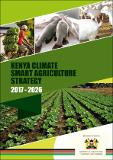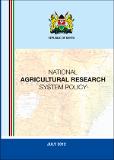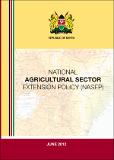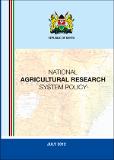Kenya Climate Smart Agriculture Strategy 2017-2026
Publication Date
2017Author
Type
Strategy Paperviews
downloads
Metadata
Show full item recordBy
Ministry of Agriculture
Abstract/
Climate change is real and has become an impediment to sustainable development globally. Climate change will have a range of positive and negative impacts in agriculture depending on the regions of the world. The negative impacts are expected to be more adverse in developing countries, particularly those in sub-Saharan Africa such as Kenya which has experienced increasing temperatures from 1960’s coupled with increased frequency and intensity of extreme weather events such as El Niño and La Niña. Effects of the negative impacts will include declining agricultural productivity and loss of crops, livestock, fish and investments in agriculture due to changing temperatures and precipitation regimes and increased frequency and intensity of extreme weather events. Further, fisheries and aquaculture are affected through acidification of the water bodies, changes in water temperatures and circulation patterns which alter the physicochemical properties the fish habitats and ultimately the productivity.
Subject/
Agriculture Sector; Climate Chage; Smart Agriculture; Greenhouses; Resource Mobilization; Kenya
Publisher
Ministry of AgricultureSeries
Strategy Paper; 2017-2026Collections
- Strategy Papers [44]
Related items
Showing items related by title, author, creator and subject.
-
National Agricultural Research System Policy 2012
Agricultural Sector Coordination Unit (ASCU) (Ministry of Agriculture, 2012)The policy objectives are: improving agricultural research policy framework; harmonizing and providing direction to national research for sustainable development; strengthening the legal, institutional and regulatory ... -
Sessional Paper No. 04 of 2011 on National Agricultural Sector Extension Policy (NASEP)
Ministry of Agriculture, Livestock & Fisheries (Ministry of Agriculture, Livestock & Fisheries, 2011)The agricultural sector provides a livelihood for about 80 percent of Kenya's population, most of whom are subsistence farmers in rural areas. The sector contributes about 24 per cent to the GDP and another 27 per cent ... -
Kenya Youth Agribusiness Strategy 2017-2021: Positioning the youth at the forefront of Agricultural Growth and Transformation
Ministry of Agriculture, Livestock & Fisheries (Ministry of Agriculture, Livestock & Fisheries, 2017)Youth account for 35.4% of Kenya’s population (World Bank 2014), with 1,000,000 entering the labour market annually (Kenya Country Report on Youth Employment, 2014). They offer a dynamic work force that is innovative; have ...




